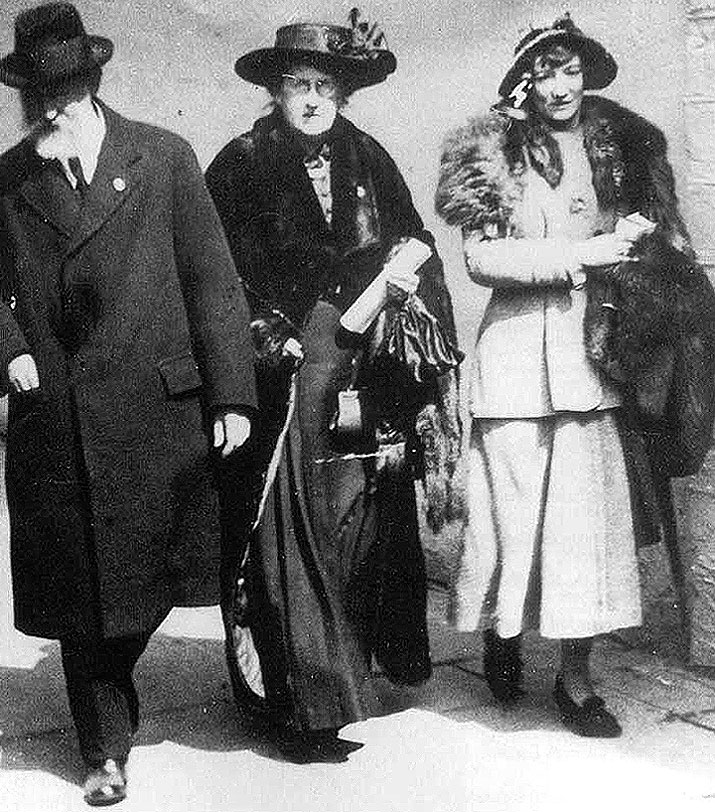|
Grace
endured several almost unimaginable losses within the time span of just
over a year. Aside from the loss of Joe, Thomas MacDonagh, her brother-in-law,
and many of her friends were also executed for leadership roles in the
Rising. In August 1917, her
sister, Muriel, (Thomas MacDonagh's widow) drowned, leaving two small
children. One month later, Grace's
father died.
Grace continued her
career as an artist, eventually becoming quite successful. She used her
talents to promote Sinn Fein policies and earned her living as a commercial
illustrator. Grace was elected to the executive of Sinn
Fein in 1917 and continued to support the struggles for Irish independence
her entire life. Many Sinn Fein
members were also involved in the Volunteers and the Irish Republican
Brotherhood, and their separatist policies become more accepted after
the Rising. Sinn Fein candidates, including Count George Plunkett, Joe's
father, won three elections to the Parliament in 1917.
In 1919, Grace published
a book of her political cartoons entitled To Hold as Twere.
Grace and her sisters
were strongly opposed to the Treaty of 1921, which divided Ireland into
the Republic of Ireland and British-ruled Northern Ireland. Grace wrote
letters to several publications stating that the republic proclaimed by
the signers of the Proclamation of the Irish Republic in 1916 was a reality
that should be honoured by all Irish people.
In
an article entitled "The White Flag of 1916", published in Poblacht
na h-Éireann Vol.1 No.12 March 15, 1922, Grace wrote:
I am far from thinking that all those who are in support of the
Treaty are necessarily dishonest. Far from it. Some of them are merely
those who, after the long, exhausting period in the wilderness of error,
have temporarily lost the strength of soul that took them through it
- the strength that proved their nobility again and again. Now, in the
natural reaction after the rigours of that 'forty days', they are brought
by a temper up to a huge mountain and offered a kingdom at a price.
Christ choose hunger rather than make a disgraceful contract with
the devil. That the Treatists in their innermost hearts think the Treaty
disgusting (and the Oath that binds them, or ought to bind them if oaths
are to be taken seriously, to the Free State only, and not to a future
Republic) is proved by their repeated assertions that they mean to break
that Oath, and work on for the Republic.
That is the point - the price to be paid. Ireland must pause and
think before she pays it. The woman, who in desperate circumstances,
accepts comfortable conditions at the price of her honour, has many
good material arguments to back up her decision. Having more money,
she can then assist others in their distress, give employment, perhaps,
and get, for the first time, 'the right to live her own life'.
Who, with any practical sense, would reject the substance for the
shadow? A few hasty words read by a Priest, a blessing that cannot be
grasped in the hand, and is less tangible than air - are these absurdities
to stand in the way of her chance of 'living her own life'?
So say the Treatists regarding Oaths. This being so, and the Government
of Ireland being for the present in their hands, one is forced to ask:
What is to be the national standard? Is honour to have a place in national
life?
Ireland today stands in the position of the woman about to barter
her honour. Do intangible things matter? Or must we as a country aim
only for things that can be grasped in the hand? Our national soul must
answer 'Yes' or 'No'. If the value of intangible things is denied, why
stop anywhere?
Let us break our vows of marriage and our pledged words in other
directions, when nothing tangible, no arm of the law can keep us to
them. Let us shut the churches and drive God from the place of honour
he holds in the land.
Joseph Plunkett marching with the white flag, surrendered but only
his body. He gave his life rather than take a shameful Oath of Allegiance
to the Empire. That he could have saved his life at this cost is certain.
England always knew it would pay better to have Ireland contented
on her terms; and no doubt the men who laid down their lives in Easter
Week could have got 'terms of agreement' had they mentioned them. General
Smuts in South Africa, got them readily in like circumstances.
But Joseph Plunkett knew what those terms would be, and forebore
to negotiate. As he loved Ireland enough to lay down his life for her,
it will be admitted that he loved her enough to wish to see her at peace.
But he made no offers, like [General] Smuts, to take the easy road,
knowing the penalties.
In 1923,
during the Irish Civil War, Grace (along with many other republicans)
spent three months in Kilmainham Gaol (Jail) because of suspected subversive
activities against the Free State government.
Finding work as an artist
was difficult in the depressed Irish economy after the Civil War, and
Grace quite often lived in impoverished surroundings. She continued doing
commercial art and cartoons, eventually developing a larger audience and
several sponsors. Her book of theatre sketches, Twelve Nights at the
Abbey Theatre and a second book of her cartoons received very positive
public response and enthusiastic acknowledgment of her talents among her
peers. By 1930, Grace was firmly established as an important member of
Dublin's cultural community.
Grace is described as being
very stylish, generous, outgoing and having a "mercurial" wit.
She could occasionally become temperamental, which is understandable when
considering all that she had lived through. She was very devoted to her
several nieces and nephews, and spent much of her time with family. Grace
also enjoyed the company of friends and the many cultural events that
her beloved Dublin had to offer.
|
